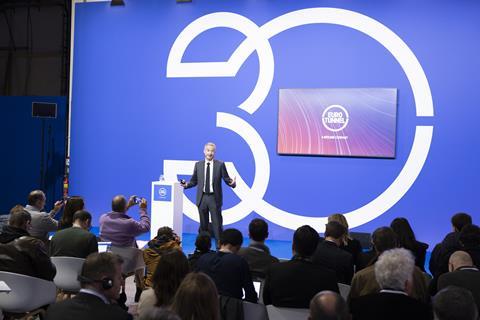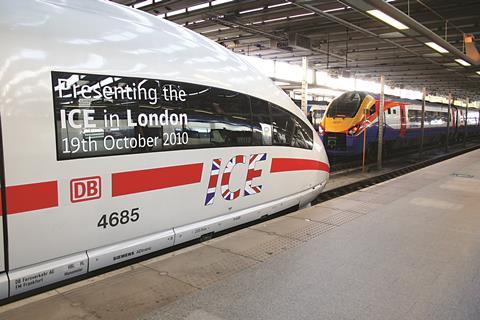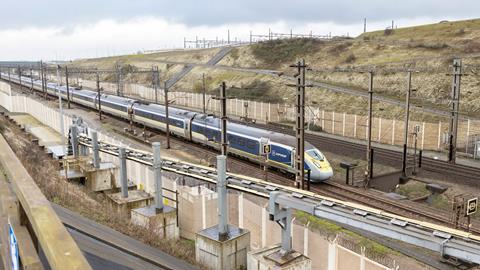EUROPE: Eurotunnel is working with rolling stock suppliers and safety authorities to simplify the standards that apply to cross-Channel rail traffic. These standards will be incorporated into the design of trains now being developed or built in the future.
Announcing this on December 14 at an event held at the French Channel Tunnel terminal in Coquelles to mark the forthcoming 30-year anniversary of the Tunnel’s formal opening on May 6 1994, Eurotunnel, now a wholly-owned subsidiary of Getlink, said that the change would pave the way for the doubling of direct high speed rail services between the UK and the European mainland over the next 10 years.
The company said that the doubling of high speed services through the Tunnel would be achieved by reducing the ‘time to market from 10 to five years for operators who intend to launch new services between London and Köln, London and Frankfurt, London and Genève and London and Zürich’.
High speed catalyst

Getlink Chief Executive Yann Leriche said that ‘the Channel Tunnel is the catalyst for the acceleration of high speed passenger traffic between London and Europe’s major cities. The attractiveness of the open access model and the impetus driven by Eurotunnel as infrastructure manager to develop new destinations are key factors in the growth of low-carbon mobility between the UK and continental Europe’.
Among organisations that have publicly indicated their interest in a through service competing with existing operator Eurostar are Dutch-based Heuro and the Spanish-based company Evolyn. Other potential operators reported to be interested in the cross-Channel high speed market include QBuzz, a Trenitalia subsidiary; Deutsche Bahn, which brought a demonstration ICE train to London in October 2010; RENFE from Spain; and Virgin Group.
More capacity available
Around 400 trains a day, most of which are the car and lorry shuttle services, currently run through the Tunnel, but there is sufficient capacity for many more, possibly up to 1 000 a day, with ‘room for everyone’, according to one senior Getlink executive. As Leriche put it, there are ‘lots of opportunities in a very favourable context’ as Getlink ‘opens the second chapter in our history’.

The changes in the standards applying to cross-Channel trains have been developed with the EU Agency for Railways, Établissement Public de la Sécurité Ferroviaire in France and the Office of Rail & Road in the UK. A number of changes are envisaged, while the requirement to run very long trains in order for part of the train to be adjacent to one of the cross-passages in the undersea running tunnels which are spaced at 375 m intervals was dropped some time ago; the TMST trainsets were built to a length of 393∙7 m and their Siemens-built Velaro successors are 400 m long.
Among incentives that may attract operators to compete with Eurostar is the possibility of financial aid from Eurotunnel, which through its ETICA (Eurotunnel Incentive for Capacity Additions) programme has to date contributed €9m towards Eurostar’s London – Amsterdam service; this figure will rise to €23m in 2025-30, Eurotunnel says.
Potential markets
Eurotunnel notes that the 1 million trips a year made on Eurostar’s London – Amsterdam route represent just one-third of the potential rail market. Among other markets where Eurotunnel sees potential are London to Frankfurt via Köln, which could be reached in under 5 h with rail having the potential to take half the 4 million annual trips made by air. Similarly, rail could carry 1 million passengers a year on the London – Genève route with a 5½ h journey time, the air market on this route being around 2∙5 million trips a year. Bordeaux, Lyon and Marseille are other possible destinations.
Eurostar ran a seasonal service from London to Lyon, Avignon and Marseille from 2015 to 2020 and has operated limited winter sports services to the French alps, although these will not run in the 2023-24 season, passengers now being required to change trains in Lille.
A suggestion that the existing terminal used by Eurostar at London St Pancras could not handle additional passengers if other operators were to launch additional international services was dismissed by Leriche, who said that ‘space will be found’ and that discussions were in progress.


















